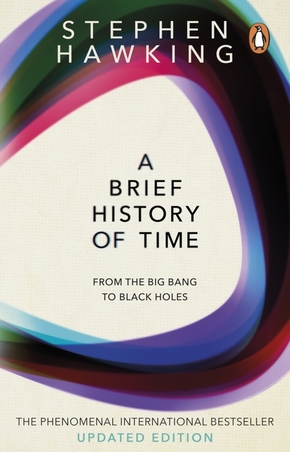A Brief History Of Time - From Big Bang To Black Holes. Aventis Prizes 1989 (Royal Society Prizes for Science Books). Introduction by Carl Sagan. Ausgezeichnet: Aventis Prize, 1989
| Verlag | Random House UK |
| Auflage | 2011 |
| Seiten | 240 |
| Format | 12,7 x 19,8 x 1,7 cm |
| B-Format | |
| Gewicht | 212 g |
| Artikeltyp | Englisches Buch |
| ISBN-10 | 0857501003 |
| EAN | 9780857501004 |
| Bestell-Nr | 85750100EA |
Stunningly repackaged edition of the international bestseller with a new appendix of updates from the author.
Was there a beginning of time? Could time run backwards? Is the universe infinite or does it have boundaries?
These are just some of the questions considered in the internationally acclaimed masterpiece by the world renowned physicist - generally considered to have been one of the world's greatest thinkers. It begins by reviewing the great theories of the cosmos from Newton to Einstein, before delving into the secrets which still lie at the heart of space and time, from the Big Bang to black holes, via spiral galaxies and strong theory. To this day A Brief History of Time remains a staple of the scientific canon, and its succinct and clear language continues to introduce millions to the universe and its wonders.
This new edition includes recent updates from Stephen Hawking with his latest thoughts about the No Boundary Proposal and offers new information about dark energy, the information paradox, eternal inflation, the microwave background radiation observatio ns, and the discovery of gravitational waves.
It was published in tandem with the app, Stephen Hawking's Pocket Universe.
Rezension:
This app/book version of Hawking's famous laymen book is just an amazing piece of learning. This makes much more accessible and understandable the complex and awesome topics dealt by Hawking as he explains how our universe works. I am just in awe at how creative he is to produce one of a kind e-book like this. The pace, illustrations and connections of topics within the book are so helpful and so appropriate for the new generation used to tweets and small bites of information. You can flip over some topics when you have some time, learn some amazing fact, and come back later which no rush or worry about how fast you are progressing through the book. Hope other books on complex topics are translated to this format. And I love the updates of the latest science since the publication of the original book. We have learned so much in the last decade that I agree with Hawking, it is an honour to live in this times. Ribozyme

